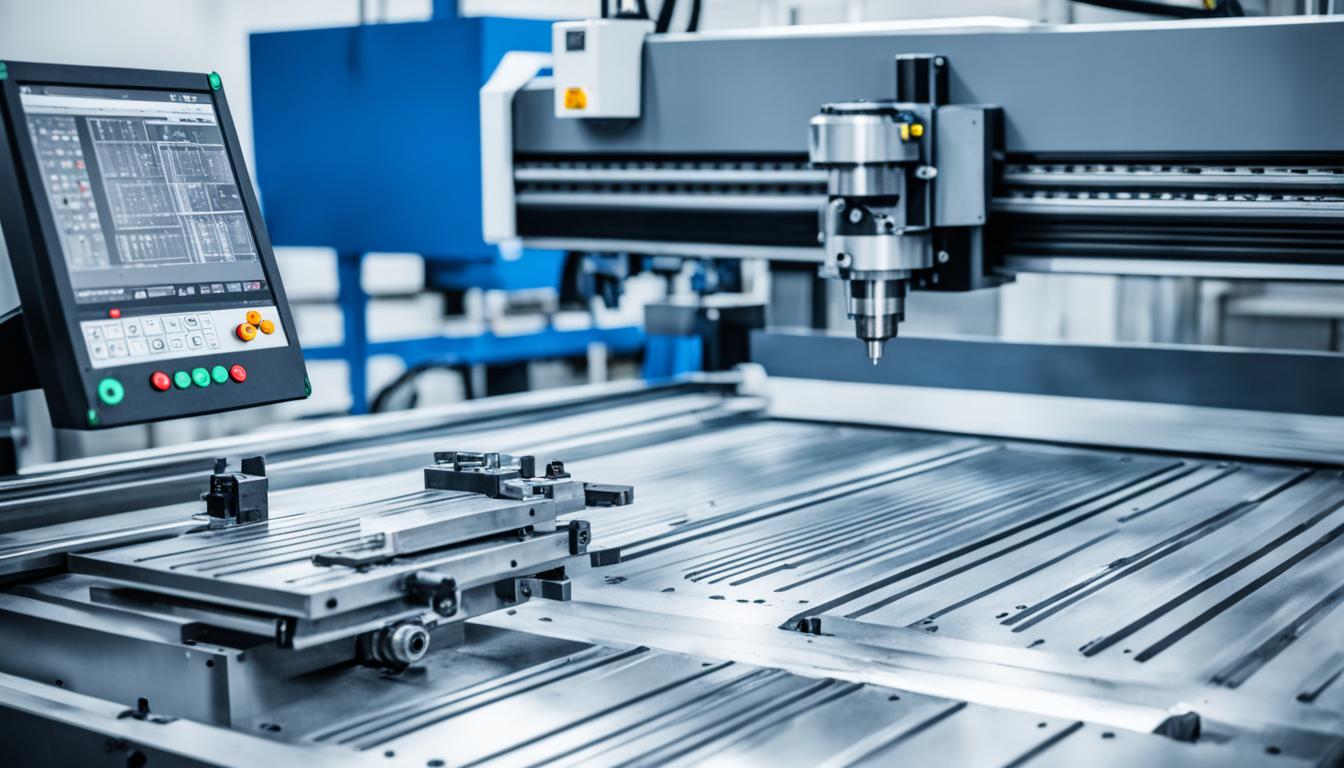Securing CNC operations requires implementing robust software security measures to protect against cyber threats and ensure operational integrity. Essential tips include regularly updating and patching CNC software to address vulnerabilities, implementing strong access controls and authentication protocols to prevent unauthorized access, encrypting sensitive data and communications to safeguard proprietary information, and conducting regular security audits and penetration testing to identify and address potential weaknesses.
These measures help protect against malware, data breaches, and industrial espionage while maintaining the reliability and efficiency of CNC processes. By prioritizing software security, manufacturers can safeguard their intellectual property, maintain production quality, and ensure compliance with industry regulations. Implementing these critical security practices not only protects valuable assets but also enhances overall operational resilience in an increasingly digital manufacturing landscape.
- Use intrusion prevention and detection systems to monitor and detect malicious activity
- Implement network segmentation to limit exposure to potential cyber threats
- Ensure proper patch management to keep CNC machines up to date with necessary security updates
- Adopt secure deployment practices and network segmentation to enhance overall protection
- Protect critical data and assets through secure remote access and cybersecurity awareness
The Risks Faced by CNC Machines in Industry 4.0
The rapid advancement of Industry 4.0 technologies has revolutionized the manufacturing landscape, providing numerous benefits and opportunities. However, along with these advancements come new risks and challenges that must be addressed to ensure the security and integrity of CNC machines.
CNC machines, which are critical components of modern manufacturing operations, are now more vulnerable than ever to cyber threats. Malicious actors can exploit vulnerabilities in CNC machine software and hardware, compromising their internal configuration and parameters. This tampering can result in severe damage to the machines themselves or the products being manufactured.
Another significant risk faced by CNC machines is the potential for denial-of-service attacks. By altering the functionalities of CNC machines, attackers can disrupt operations, leading to production delays and financial losses for manufacturers.
Hijacking CNC machine parameters is yet another concern. By manipulating the machine settings, cybercriminals can cause the production of defective parts, compromising the quality and reliability of manufactured products.
Additionally, CNC machines are attractive targets for data theft. The valuable intellectual property and sensitive information stored within these machines make them prime candidates for cybercriminals seeking to steal trade secrets or gain unauthorized access to proprietary data.
Recognizing the seriousness of these threats, the Industrial Control Systems Cyber Emergency Response Team (ICS-CERT) has released advisories to raise awareness regarding the vulnerabilities and cyber risks associated with CNC controllers.
Understanding CNC Machine Security Risks
The following table provides an overview of the main security risks faced by CNC machines in Industry 4.0:
| Risk | Description |
|---|---|
| Internal Configuration Tampering | Malicious actors can exploit vulnerabilities in CNC machine software and hardware to manipulate internal configuration settings, leading to potential damage. |
| Denial-of-Service Attacks | Attackers can alter the functionalities of CNC machines, causing disruptions in manufacturing processes and significant financial losses. |
| Hijacking of Machine Parameters | Cybercriminals can manipulate machine settings to produce defective parts, compromising the quality and reliability of manufactured products. |
| Data Theft | CNC machines are attractive targets for cybercriminals seeking to steal valuable intellectual property and sensitive data. |
Understanding these risks is crucial for manufacturers aiming to enhance the cybersecurity of their CNC operations. In the next section, we will explore cybersecurity measures that can be implemented to mitigate these threats and protect CNC machines in Industry 4.0.
Cybersecurity Measures for CNC Machines
To protect CNC machines from cyber threats, manufacturing companies can implement a variety of cybersecurity measures. These measures are crucial in securing manufacturing operations and ensuring the protection and integrity of CNC machine data.
Context-Aware Industrial Intrusion Prevention and Detection Systems (IPS/IDS)
A context-aware IPS/IDS system is an essential component of CNC machine cybersecurity. These systems monitor network traffic and analyze it in real time to identify and distinguish between legitimate work requests and malicious activities. By detecting potential threats and intrusions, organizations can take proactive measures to mitigate and prevent cyber attacks on their CNC machines.
Network Segmentation
Network segmentation plays a significant role in the protection of CNC machines. By dividing the network into smaller segments, manufacturers can limit the number of exposed interfaces that cybercriminals could target. Through network segmentation, organizations can isolate CNC machine networks, preventing unauthorized access and reducing the potential impact of a security breach.
Proper Patch Management
Keeping CNC machines up to date with the latest patches is crucial for their cybersecurity. Regularly updating software and firmware helps address vulnerabilities and weak points that attackers could exploit. By implementing proper patch management procedures, manufacturers can deter cybercriminals from gaining unauthorized access to CNC machines and compromising their operations.

By implementing these cybersecurity measures, manufacturing companies can significantly enhance the protection of their CNC machines and secure their overall manufacturing operations. Ensuring the cybersecurity of CNC machines is of utmost importance in the age of Industry 4.0, where interconnectivity has increased the risk of cyber threats. The adoption of these measures will help safeguard critical data, prevent unauthorized access, and maintain the integrity of CNC machine operations.
The Importance of Secure Deployment and Network Segmentation
When it comes to protecting CNC machines, secure deployment and network segmentation play a critical role. Whether you’re setting up new machines or dealing with legacy equipment, taking the necessary security measures is crucial to safeguarding your operations.
Legacy CNC machines are particularly vulnerable due to the lack of air-gapping, making secure deployment even more essential. To ensure the protection of your CNC machines, it’s important to verify that your networking devices have embedded security features that adhere to relevant security standards.
Disabling unused ports and services on your network can help minimize entry points for potential intruders. By reducing the available attack surface, you can significantly enhance your system’s defense against unauthorized access.
However, network segmentation is an indispensable step in protecting CNC machines from cyber threats. By dividing the network into smaller segments, you can isolate CNC machines from other devices and systems, limiting the potential impact of a compromise.
In addition to network segmentation, deploying firewalls that can recognize and filter industrial protocols is critical for providing vertical and horizontal protection. These firewalls act as a barrier, preventing unauthorized access and filtering out potentially malicious traffic.
The Benefits of Secure Deployment and Network Segmentation
The benefits of secure deployment and network segmentation for CNC machines are numerous. By implementing these strategies, manufacturers can:
- Minimize the risk of unauthorized access and data breaches
- Protect CNC machines from cyber threats and attacks
- Reduce the potential impact of a compromise by isolating CNC machines
- Ensure compliance with industry-specific security standards
- Enhance overall industrial network security
| Secure Deployment | Network Segmentation |
|---|---|
| Reduces the risk of unauthorized access | Isolates CNC machines from other devices and systems |
| Enhances protection against cyber threats | Limits the potential impact of a compromise |
| Ensures compliance with security standards | Improves industrial network security |
Implementing secure deployment practices and network segmentation is crucial for safeguarding CNC machines and ensuring the uninterrupted operation of your manufacturing processes.
Protecting Critical Data and Assets in CNC Operations
CNC operations play a crucial role in the manufacturing industry, generating valuable data that drives business decisions and operational efficiency. However, the increasing connectivity of CNC systems and the adoption of cloud technologies present new challenges for data protection and asset security.
When leveraging cloud technologies for data analysis, it is essential to prioritize CNC data protection. Data encryption should be implemented to safeguard sensitive information, preventing unauthorized access and ensuring confidentiality. Additionally, establishing secure remote access using virtual private networks (VPNs) can create a protected channel for remote monitoring and control, minimizing the risk of unauthorized entry to CNC systems.
Involving vendors, system integrators, and service engineers in cybersecurity policies is also vital to protect critical assets in CNC operations. Collaborating with trusted partners ensures that security measures are implemented during system deployment and maintenance, bolting down vulnerabilities and minimizing potential risks.
Moreover, industrial cybersecurity awareness should be a top priority across the organization. By fostering a culture of cybersecurity, employees become more vigilant and proactive in identifying and mitigating potential threats. Implementing security programs, policies, and training sessions can help raise awareness and enforce proper system settings and configurations.
Risk assessment is crucial for identifying vulnerabilities and determining priority security measures. It allows manufacturers to allocate resources efficiently, focusing on areas that pose the highest risk to critical data and assets. By taking a targeted approach to cybersecurity, manufacturers can strengthen their defense mechanisms and protect CNC operations from malicious attacks.

Ensuring Network Security for CNC Machine Monitoring
Machine monitoring systems play a crucial role in connecting CNC machines to a network for data collection and analysis. However, with the increasing risks of cyberattacks and data theft in the Industrial Internet of Things (IIoT) era, network security is of utmost importance. To protect CNC machine data and ensure the reliability of machine monitoring systems, manufacturers must implement robust network security measures.
One key step is to change default passwords on routers and switches. Default passwords are often well-known and easily exploitable by attackers. By setting strong, unique passwords, manufacturers can significantly reduce the risk of unauthorized access to their network.
In addition, using strong wireless encryption is essential to safeguard the communication between CNC machines and the monitoring system. Encryption protocols such as WPA2 or the latest WPA3 provide a secure channel for transmitting data, preventing unauthorized interception.
Furthermore, keeping personal computers and servers up to date with security updates is crucial. Regularly patching these systems ensures that any known vulnerabilities are addressed, minimizing the risk of exploitation by attackers.
Lastly, implementing hardware firewalls adds an additional layer of network security by filtering incoming and outgoing traffic. These firewalls can identify and block malicious connections, protecting CNC machine data from unauthorized access.
By following these network security measures, manufacturers can effectively protect CNC machine data, maintain the integrity of their machine monitoring systems, and mitigate the risks associated with cyberattacks and data theft.
